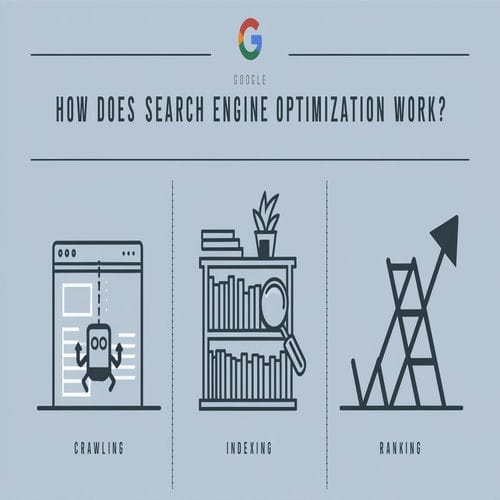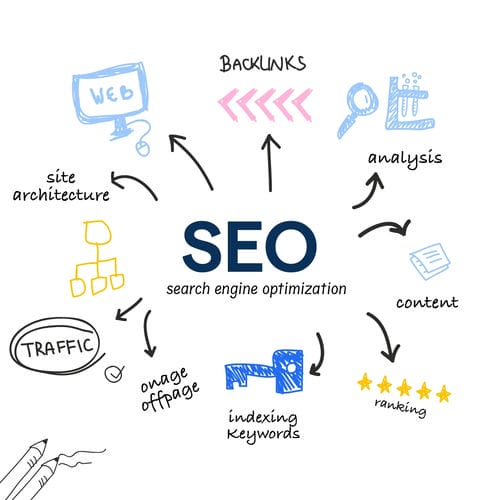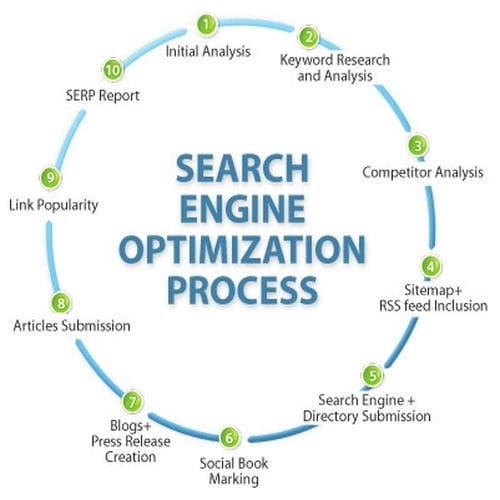Why does your favourite website always appear at the top of your search results? This isn’t a happy accident but the result of carefully implemented strategies known as Search Engine Optimization (SEO).
“How does search engine optimization work” – Understanding the intricacies of how search engine optimization operates is pivotal for unlocking your website’s potential and driving organic traffic.
In today’s digital age, understanding how SEO works can be the difference between a bustling website and a deserted one.
By optimizing your site, you’re essentially communicating with search engines, helping them understand the relevance and quality of your content. This not only improves your rankings but also drives organic traffic to your site.
In this article, we’ll break down the complex world of SEO into manageable pieces, so you can see exactly how it works and why it’s essential for your online success. Stick with us to unlock the secrets of SEO and learn how to make your website stand out in the crowded digital landscape.
How Does Search Engine Optimization Work?
1. What Are Search Engines?
Search engines are online tools that help users find information on the internet. Popular search engines include Google, Bing, and Yahoo. They work by scanning the web for content that matches users’ search queries and displaying the most relevant results.
2. How Do Search Engines Work?
Search engines perform three primary functions: crawling, indexing, and ranking.
- Crawling involves search engines sending out bots, also known as spiders, to explore web pages and follow links. These bots collect data from each page they visit.
- Indexing is the process of storing and organizing the content found during crawling. Indexed pages are added to a massive database, which search engines reference when responding to a search query.
- Ranking determines the order in which search results are displayed. Search engines use complex algorithms to evaluate various factors, such as relevance and quality of content, to rank pages.
Importance of Understanding Search Engines
For effective SEO, it’s crucial to understand how search engines work. Knowing the processes of crawling, indexing, and ranking can help you optimize your website more effectively.
This knowledge enables you to create content that meets search engine criteria and improves your chances of ranking higher in search results.
Imagine having the best product or service but no one finding your site. Frustrating, right? SEO ensures that your website is visible to people searching for related topics on search engines like Google and Bing.
It’s about making your website more attractive to search engines through various on-page and off-page techniques. By grasping these fundamental concepts, you set a solid foundation for implementing successful SEO strategies.
Continue reading to delve deeper into the key components of SEO and how they contribute to better search engine rankings.
Must Read:
Key Components of SEO
1. On-Page SEO
On-page SEO refers to the optimization techniques applied directly on your website. It involves improving various elements to enhance your site’s visibility and relevance to search engines.
- Content Optimization is a crucial aspect of on-page SEO. This includes conducting keyword research to identify the terms your target audience uses and incorporating these keywords naturally into your content. Creating high-quality, relevant content that addresses the needs and queries of your audience is essential.
- Additionally, optimizing meta titles and descriptions helps search engines understand the context of your pages, influencing how they are indexed and ranked.
- HTML and Code Optimization involves using header tags (H1, H2, etc.) to structure your content, adding alt text to images to describe their content to search engines, and ensuring URLs are clean and descriptive.
- Internal linking is also important, as it helps distribute page authority throughout your site and makes navigation easier for users and search engines alike.
2. Off-Page SEO
Off-page SEO focuses on activities outside your website that can influence your search engine rankings.
- Backlinks are a primary factor in off-page SEO. These are links from other websites pointing to your site. High-quality backlinks from reputable sources signal to search engines that your content is valuable and trustworthy. Strategies to acquire backlinks include guest blogging, influencer outreach, and creating shareable content.
- Social Signals also play a role in off-page SEO. While their direct impact on rankings is debated, social media engagement can drive traffic to your site and increase brand visibility. Encouraging shares, likes, and comments on your content can indirectly boost your SEO efforts.
3. Technical SEO
Technical SEO ensures that your website meets the technical requirements of search engines for crawling and indexing.
- Site Architecture involves creating an organized structure that makes it easy for search engines to navigate and index your site. This includes having a clear URL structure, an XML sitemap, and a properly configured robots.txt file.
- Page Speed is critical for user experience and rankings. Techniques to improve page speed include compressing images, minifying CSS and JavaScript files, and using browser caching.
- Mobile Optimization ensures that your site is responsive and provides a good user experience on mobile devices. Implementing Accelerated Mobile Pages (AMP) can further enhance mobile performance.
- Secure Connections (HTTPS) protect user data and are a ranking factor. Obtaining and installing an SSL certificate ensures your site uses HTTPS, which builds trust with users and search engines.
Understanding and implementing these key components of SEO—on-page, off-page, and technical SEO—lays the foundation for a successful SEO strategy. Each component plays a vital role in improving your site’s visibility and ranking in search engine results.
Trending Articles:
How to Configure WordPress Settings for SEO?
1. General Settings
Configuring WordPress settings for SEO begins with the basics. Start by setting a clear and concise site title and tagline that reflects your brand and includes relevant keywords. Ensure your permalinks are SEO-friendly by navigating to Settings > Permalinks and selecting the “Post name” option. This makes your URLs clean and descriptive.
2. SEO Plugins
SEO plugins are essential for optimizing your WordPress site. Popular options include Yoast SEO and All in One SEO Pack. After installing a plugin, follow the setup wizard to configure basic settings. These plugins help you manage meta titles, descriptions, and XML sitemaps, ensuring your site is optimized for search engines.
3. Content Optimization
Optimizing your content is crucial for SEO success. Use your SEO plugin to add meta titles and descriptions to each page and post. These elements provide search engines with a summary of your content, helping them understand its relevance.
Ensure your content includes targeted keywords naturally and provides valuable information to your audience.
4. Advanced Settings
Advanced settings in WordPress SEO plugins can further enhance your site’s performance. Implement schema markup to provide search engines with structured data about your content. This can improve how your site appears in search results, potentially increasing click-through rates.
Enable breadcrumbs to improve site navigation and provide search engines with a clear site structure. Also, configure social sharing settings to ensure your content is optimized for sharing on social media platforms.
Trending Now-a-Days:
SEO Strategies and Best Practices
1. Keyword Research
Effective SEO begins with thorough keyword research. Use tools like Google Keyword Planner, Ahrefs, or SEMrush to identify keywords relevant to your industry and audience. Focus on a mix of short-tail and long-tail keywords to capture a broader range of search queries.
Prioritize keywords with a good balance of search volume and competition to maximize your chances of ranking.
2. Content Creation and Optimization
Creating high-quality, valuable content is crucial for SEO success. Ensure your content addresses the needs and queries of your target audience. Use your identified keywords naturally throughout your content, including in titles, headings, and body text. Regularly update and refresh your content to keep it relevant and engaging.
3. Link Building
Building a robust backlink profile is essential for improving your site’s authority and search rankings. Focus on acquiring high-quality backlinks from reputable websites.
Strategies for gaining backlinks include guest blogging, creating shareable infographics, and reaching out to influencers and industry leaders. Avoid black-hat techniques like buying links, as these can lead to penalties.
4. Regular SEO Audits
Conducting regular SEO audits helps maintain and improve your site’s performance. Use tools like Google Search Console, Screaming Frog, or Moz to identify and fix issues such as broken links, duplicate content, and slow page speeds.
Regular audits ensure your site remains optimized and compliant with the latest search engine guidelines.
Measuring SEO Success
1. Key Metrics to Track
Tracking key metrics is essential for evaluating the effectiveness of your SEO efforts.
- Organic Traffic: Monitor the volume of organic traffic your website receives over time. Increasing organic traffic indicates improved visibility and rankings in search engine results.
- Keyword Rankings: Keep track of your website’s rankings for target keywords. Movement up or down in search results can indicate the effectiveness of your optimization efforts.
- Backlinks: Monitor the quantity and quality of backlinks pointing to your site. High-quality backlinks from authoritative sources signal to search engines that your content is valuable and trustworthy.
- Conversion Rates: Measure the percentage of visitors who take desired actions on your site, such as making a purchase or filling out a contact form. Improving conversion rates indicates that your website is effectively attracting and engaging your target audience.
2. Tools for Measuring SEO Performance
Several tools are available to help you measure and analyze your SEO performance.
- Google Analytics: Provides comprehensive data on website traffic, user behavior, and conversions. Use it to track organic traffic, keyword rankings, and user engagement metrics.
- Google Search Console: Offers insights into how Google crawls and indexes your site. Monitor search performance, index coverage, and mobile usability issues.
- Third-Party SEO Tools: Platforms like Ahrefs, SEMrush, and Moz offer advanced features for tracking keyword rankings, analyzing backlinks, and conducting site audits.
Is SEO Dead?
1. The Evolution of SEO
Over the years, SEO has evolved significantly in response to changes in search engine algorithms and user behavior. What worked in the past may not be as effective today, leading some to question the relevance of SEO in the modern digital landscape.
2. Current Trends
SEO remains a crucial component of online marketing strategies. Current trends, such as the rise of voice search and advancements in artificial intelligence, have reshaped the SEO landscape, but they have not rendered it obsolete.
3. The Future of SEO
Looking ahead, SEO is expected to continue evolving alongside emerging technologies and shifting user preferences. While the specifics of SEO tactics may change, the fundamental principles of providing valuable content and optimizing for user experience are unlikely to disappear.

What Is the Most Important SEO Factor?
1. Content Quality
High-quality content is widely regarded as the most important SEO factor. Search engines prioritize content that is relevant, valuable, and engaging to users.
Quality content not only attracts visitors to your website but also encourages them to stay longer and interact with your site, signaling to search engines that your content is worth ranking higher.
2. Backlinks
Backlinks, or links from other websites pointing to yours, are another critical SEO factor. Quality backlinks from reputable sources act as votes of confidence in your content, indicating to search engines that your site is authoritative and trustworthy.
However, not all backlinks are created equal, and it’s essential to focus on acquiring high-quality, relevant backlinks from authoritative websites in your industry.
3. User Experience (UX)
User experience plays a significant role in SEO. Search engines prioritize websites that provide a seamless and satisfying experience for users. Factors such as page speed, mobile-friendliness, and intuitive navigation contribute to a positive user experience.
By prioritizing UX, you can improve engagement metrics like bounce rate and dwell time, signaling to search engines that your site is valuable to users.
While various factors influence search engine rankings, content quality emerges as the most crucial SEO factor. By focusing on creating valuable content, building high-quality backlinks, and prioritizing user experience, you can improve your site’s visibility and ranking in search results.
How Long Does SEO Take to Work?
1. Factors Affecting SEO Timeline
Several factors influence how long it takes to see results from SEO efforts.
- Competition: The level of competition in your industry can impact how quickly you see results. Highly competitive industries may require more time and effort to rank well in search results.
- Keyword Difficulty: The difficulty of the keywords you’re targeting also plays a role. Highly competitive keywords may take longer to rank for compared to less competitive ones.
- Content Quality: The quality and relevance of your content can affect how quickly search engines recognize and reward your efforts. High-quality, valuable content is more likely to rank well over time.
2. Typical Timeline for Results
While SEO is a long-term strategy, you can typically expect to see some results within a few months of implementing your SEO efforts. However, significant improvements may take six months to a year or more to materialize. It’s essential to be patient and consistent with your SEO efforts, as results often compound over time.
3. Continuous Efforts and Maintenance
SEO is not a one-time task but an ongoing process. To maintain and improve your rankings, you must continually monitor and optimize your website. This includes regularly updating and refreshing your content, acquiring high-quality backlinks, and staying abreast of algorithm changes and industry trends.
While SEO may not provide instant results, it is a highly effective long-term strategy for improving your website’s visibility and attracting organic traffic. By understanding the factors that influence SEO timelines and consistently implementing best practices, you can achieve sustained success in search engine rankings.
Conclusion
In conclusion, understanding how search engine optimization (SEO) works is essential for enhancing your website’s visibility and attracting organic traffic. By implementing effective SEO strategies and best practices, you can improve your site’s rankings and ultimately grow your online presence.
Our experts can help you develop a tailored SEO strategy to optimize your site and achieve your business goals.
If you’re ready to take your website to the next level, consider reaching out to our team at Devtrain.co. Don’t miss out on the opportunity to maximize your online potential – contact us today!






